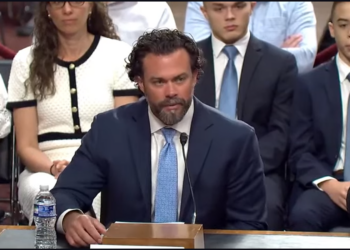Records obtained by U.S. intelligence officials indicate the FBI would play a role in putting “more oil into the fire” of the Russia collusion hoax ahead of the 2016 presidential election, according to newly declassified documents released Thursday.
The apparent revelation was included in a previously classified appendix that was a part of John Durham’s 2023 Special Counsel report on the origins of the fabricated scheme attempting to advance the falsehood that Donald Trump colluded with Moscow to steal the 2016 contest.
According to the appendix, “Beginning in or about 2014, and continuing through at least in or about 2016, individuals affiliated with Russian intelligence services hacked and gained unlawful access to emails of numerous U.S. public and private entities — including government agencies, non-profit organizations, and think tanks based in the United States.” The declassified records note that one of the nonprofits “hacked by Russian government actors in 2016” was leftist billionaire George Soros’ Open Society Foundations.
Per the appendix, a source reportedly familiar with the contents of the hacked materials (U.S.-based emails and communications) told U.S. officials that among the records were alleged emails issued by Leonard Benardo, who served as Open Society Foundations’ regional director for Eurasia. In one of the purported emails, dated July 25, 2016, Benardo allegedly indicated that the FBI would help contribute to the Hillary Clinton campaign’s reported “plan” to tie Trump to Russia.
“The media analysis on the DNC hacking appears solid. … Julie [Hillary Clinton campaign adviser] says it will be a long-term affair to demonize Putin and Trump. Now it is good for a post-convention bounce,” Bernardo allegedly wrote, according to the appendix. “Later the FBI will put more oil into the fire.”
The appendix includes a second email allegedly sent by Benardo two days later on July 27, in which he purportedly wrote, “HRC [Hillary Rodham Clinton] approved Julie’s idea about Trump and Russian hackers hampering U.S. elections. That should distract people from her own missing email, especially if the affair goes to the Olympic level.”
The appendix went on to note that when Durham’s team presented Benardo with the alleged emails, he “stated that they did not look familiar to him, and that he would not have used certain terms, such as ‘oil into the fire.’”
“Benardo also did not know who ‘Julie’ referred to in the July 25, 2016 purported emails,” the appendix reads. “Benardo stated that, to the best of his recollection, he did not draft the emails. Benardo stated, however, that the last sentence in the email — noting that ‘things are ghastly for U.S.-Russia relations’ — sounded like something he would have said.”
Julieanne Smith — the aforementioned Clinton campaign official — also denied receiving either of the Benardo emails and said that she did not “specifically remember proposing a plan to Clinton or other campaign leadership to try to tie Trump to Putin or Russia.” According to the appendix, she also said “that it was possible that she had proposed ideas on these topics to the campaign’s leadership, who may have approved these ideas,” but that “she was certain any proposal she made … seeking to highlight issues concerning Trump and Russia would not have included an effort to enlist the FBI in furtherance of those efforts.”
The appendix later noted, however, that a review of certain communications by Durham’s office involving Smith “provided possible additional support … to the notion that the Clinton campaign was engaged in an effort” to formulate a plan tying Trump to Russia. Further, the campaign “might have wanted or expected the FBI or other agencies to aid that effort … by commencing a formal investigation of the DNC hack.”
“The Office’s best assessment is that the July 25th and July 27th emails that purport to be from Benardo were ultimately a composite of several emails that were obtained through Russian intelligence hacking of the U.S.-based Think Tanks, including the Open Society Foundations, the Carnegie Endowment, and others,” the appendix reads. “Furthermore … it is a logical deduction that [redacted] Smith was, at a minimum, playing a role in the Clinton campaign’s efforts to tie Trump to Russia.”
The FBI would ultimately assist the Clinton campaign’s efforts to foment the Russia collusion hoax. In late July 2016, the agency used the phony Clinton bought-and-paid-for Steele dossier — which was composed of salacious and unverified allegations about Trump — to help launch its “Crossfire Hurricane” investigation into the Trump campaign.
Shawn Fleetwood is a staff writer for The Federalist and a graduate of the University of Mary Washington. He previously served as a state content writer for Convention of States Action and his work has been featured in numerous outlets, including RealClearPolitics, RealClearHealth, and Conservative Review. Follow him on Twitter @ShawnFleetwood
















